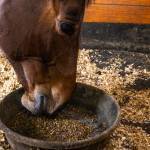Question
I have three Warmblood broodmares, all in moderately fleshy body condition and all healthy. They spend the majority of their time in stalls (about 15 hours each day) and the remainder in dry paddocks. They are fed two cups of low-starch feed a day and as much second-cutting orchardgrass as they choose. Is this diet adequate? Surely there’s nothing in this basic diet that would cause retained placentas, is there?
Answer
Regarding nutritional adequacy of your mares’ diets, you are currently underfeeding the low-starch feed at 2 cups per day. This product is formulated to meet nutrient needs when fed at a much higher feeding rate, such as 6-8 lb (2.7-3.6 kg) per day for horses weighing 1,200-1,500 lb (545-680 kg). I assume feeding this much feed would result in unnecessary weight gain for your mares.
Underfeeding fortified feeds can lead to nutritional deficiencies in certain trace minerals, including selenium, copper, and zinc, and some fat-soluble vitamins. Selenium deficiency or selenium-responsive conditions have been associated with incidences of retained placenta in multiple species. Ensuring adequate supplementation of selenium and vitamin E has been shown to reduce the incidence of retained placenta in deficient dairy cows.
A better feed option for horses that need very little feed is a ration balancer. A ration balancer is a 20 to 30% protein pellet that contains added minerals and vitamins. Fed at the recommended rate, a ration balancer will meet the mares’ nutrient needs, even during pregnancy.
In addition to providing proper nutrition throughout pregnancy and lactation, various aspects of pregnancy and foaling can be supported and, in some cases, improved through specific nutritional support. Supplementation of natural-source vitamin E and long-chain omega-3 fatty acids has been recommended for reproductive health and performance in both broodmares and stallions.
Recommended products for broodmare health include EO•3, Preserve PS, and Nano•E. EO•3 is a rich source of DHA and EPA, long-chain omega-3 fatty acids that provide anti-inflammatory benefits as well as boosting immunity in both the broodmare and foal. Supplementation with omega-3 fatty acids has been shown to improve colostrum quality and passive transfer of antibodies. Preserve PS is a comprehensive antioxidant blend offering vitamin E, selenium, magnesium, and vitamin C in one easy-to-feed supplement. Nano•E is a liquid, natural vitamin E that offers superior bioavailability in horses. Horses maintained on forage-only diets year-round benefit from supplemental vitamin E. Based on your mares’ histories, I recommend switching to a balancer pellet and supplementing with EO•3 and Preserve PS.








